In Memoriam
MEMBERS WHO HAVE PASSED
ALFRED JITSUDO ANCHETA | 1943 — 2020
 Zen monk, priest, teacher, and printmaker Roshi Alfred Jitsudo Ancheta passed from this life on May 9, 2020 at his home in Albuquerque, New Mexico. Ancheta taught traditional Japanese Zen practice for three decades in California and New Mexico. After three days of lying peacefully, he opened his eyes. Family and friends present quickly gathered in a circle around him, his dog lying at his side. He was surrounded by a tremendous amount of love as he passed.
Zen monk, priest, teacher, and printmaker Roshi Alfred Jitsudo Ancheta passed from this life on May 9, 2020 at his home in Albuquerque, New Mexico. Ancheta taught traditional Japanese Zen practice for three decades in California and New Mexico. After three days of lying peacefully, he opened his eyes. Family and friends present quickly gathered in a circle around him, his dog lying at his side. He was surrounded by a tremendous amount of love as he passed.
Ancheta was one of twelve Dharma Successors of Japanese Zen master Hakuyu Taizan Maezumi Roshi, founder of the Zen Center of Los Angeles, and was responsible for the first stages of building Zen Mountain Center in California. Ancheta also received Dharma transmission from Roshi Bernie Tetsugen Glassman in the Zen Peacemaker Order. Ancheta was the founder and abbot of Hidden Mountain Zen Center in Albuquerque and supported his students in establishing Zen practice centers in Santa Fe and Colorado Springs, Colorado. Ancheta has seven Dharma successors in New Mexico, Texas, and Colorado. His dedication to Zen practice included 18 “Angos” or 3-month intensive meditation retreats.
One of the first American Hispanic Zen teachers, Ancheta worked to promote peace and interfaith understanding and was committed to bringing the Dharma to a wider audience. He was the co-founder of the Center for the Promotion of Peace in Albuquerque, https://www.promotionofpeace.org, taught meditation at the Santa Fe Maximum Security prison, conducted homeless retreats, and worked with the Wise Men and Women mentoring program for Albuquerque schools. Ancheta participated in two transformative interfaith retreats at Auschwitz-Birkenau in Poland, organized by Zen Peacemakers https://zenpeacemakers.org
Ancheta was born in Embudo, New Mexico in 1943 to Henry Aguilar Ancheta and Marilena Guiterrez and spent his youth in Northern New Mexico and Long Beach, California. After serving in the U.S. Army as a medic and sergeant, he studied at Long Beach Junior College and the University of California at Fullerton. In 1972, he emigrated to British Columbia, Canada, where he homesteaded and farmed. He commuted to Southern California to study with Maezumi Roshi for a decade before moving to Los Angeles and ordaining as a Zen monk.
Ancheta was the first resident monk at the Zen Mountain Center and was responsible for the first stages of building roads into the undeveloped property, drilling wells, installing solar power, and assisting with construction of the Zendo, Buddha Hall, kitchen, and residential areas. He oversaw all retreats, workshops, and events at Zen Mountain Center until 1994, where he developed programs for at-risk youth and HIV/AIDS patients and their caregivers.
In 1995 Ancheta founded Hidden Mountain Zen Center in downtown Albuquerque. Passionate about living his Zen practice, Ancheta served on the Board of Directors for the Center for Action and Contemplation, a Catholic social services and meditation establishment. After 9/11, Ancheta co-sponsored a symposium in Albuquerque with Jewish and Muslim leaders to enter into dialog on religious tolerance.
Ancheta was a skilled woodblock printmaker, often collaborating on pieces with his wife, artist Diana Stetson. Printed from woodblocks and linoleum blocks, Ancheta’s original work is in fine collections around the country. Alan Arkin is his most well-known collector. Buddhist iconography provided central themes in his prints, as well as current New Mexican images. His work was chosen for Santa Fe’s annual Contemporary Spanish Market poster in 2015.
Ancheta is survived by his wife, Diana Stetson; daughter Serena Grace Ancheta Frisina; and stepson Ezra Elm Buller.
Margaret Ne-eka Barragato | 1945 — 2013
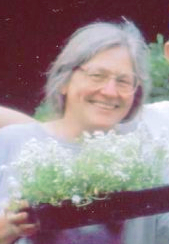 Margaret was a co-founder of Treetop Zen Center along with her late husband, Stef. Her gentle, compassionate teaching style lives on in her dharma heir, Peter Seishin Wohl.
Margaret was a co-founder of Treetop Zen Center along with her late husband, Stef. Her gentle, compassionate teaching style lives on in her dharma heir, Peter Seishin Wohl.
Margaret was born in Minneapolis and raised in the Lutheran Church. Margaret went to the University of Michigan, which was a loose family tradition. In 1967 she went to the University of California at Berkeley, and got a master of arts degree from the Graduate Theological Union. While at GTU, she learned of the spiritual exercises of St. Ignatius. She attended a number of retreats with the Jesuits there and eventually joined the Roman Catholic Church.
In Berkeley, Margaret also attended a few workshops with Tarthang Tulku Rinpoche and sat with the group at the Nyingma Institute, which formed the roots of her involvement with Buddhism.
Margaret became interested in Zen and began studying with Stef. In 2002, she received dharma transmission. Because she was also doing a lot of teaching in the Catholic Church, she chose not to be ordained as a Buddhist priest. After Margaret stopped teaching in the church, she requested ordination and received denkai (full priest ordination) in 2005.
Margaret taught at a seminary for a few years, including a course in Buddhist-Christian dialogue, in addition to working with Zen students at Treetop. She often remarked, “From both jobs, I receive more than I give.”
One of Margaret’s greatest joys was spending time with her Labrador retriever, Molly, and her two cats, Sadie and Ari. They were sources of much entertainment and much love. All in all, she enjoyed a rich life filled with many blessings.
Stefano Mui Barragato | 1930 — 2010
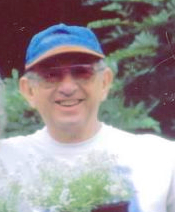
Stef was a founding teacher of Treetop Zen Center along with his wife, Margaret. Stef became a Zen priest in 1983 and received dharma transmission in 1996 from Bernie Glassman at Greyston Seminary in New York.
Stef was born in Brooklyn, New York.On his 18th birthday, during the Korean War, Stef registered for the draft as a conscientious objector. Unfortunately his draft board didn’t agree with him. He was ultimately sentenced to a year and a day at the Federal Correctional Institution at Danbury, Connecticut, for resisting the draft. This experience sensitized him to the plight of people trapped in the prison system, an issue that remained close to his heart for the rest of his life.
After prison, Stef went to Paraguay, where he lived for a decade in a pacifist Christian intentional community known as the Religious Society of Brothers, or the Bruderhof.
After returning to the States, Stef became a Quaker for the next 20 years. While still a Quaker in Pasadena, California, Stef met Taizan Maezumi Roshi, a Japanese Zen teacher. Later, in 1980, Stef decided to chuck it all and become a Zen monk. Maezumi asked Stef to go to New York and help his senior student, Bernie Glassman, who had just started the Zen Community of New York. So Stef and Margaret packed up and moved to New York, where they lived and practiced at Greyston for the next several years.
After the Barragatos left Greyston, Stef began going to a maximum-security prison in upstate New York to teach Zen to the inmates. After Margaret retired, she also taught at the prison. Together, they taught there for about 15 years.
Stef and Margaret moved to Maine in 2003, finally settling in Oakland after about four years in the Bangor area. The mother-in-law apartment above the garage was transformed into a zendo and is now the hub of Treetop Zen Center. Stef was blessed to see the first few years of the vibrant, growing sangha that formed there.
Madeline Koi Bastis | 1940 — 2007
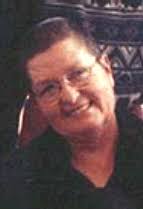 Madeline Ko-I Bastis was an ordained Buddhist priest and hospital chaplain. She worked with cancer, AIDS, psychiatric, and Alzheimer’s patients, with battered women, caregivers, inmates, with people with addictions, as well as so-called normal people. She wrote “Heart of Forgiveness: A Practical Path to Healing”
Madeline Ko-I Bastis was an ordained Buddhist priest and hospital chaplain. She worked with cancer, AIDS, psychiatric, and Alzheimer’s patients, with battered women, caregivers, inmates, with people with addictions, as well as so-called normal people. She wrote “Heart of Forgiveness: A Practical Path to Healing”Charlotte Joko Beck | 1913 — 2011
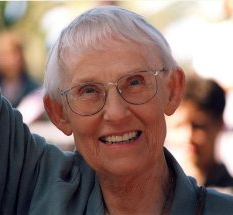
Born in New Jersey, Joko Beck studied music at the Oberlin Conservatory of Music and worked for some time as a pianist and piano teacher. She married and raised a family of four children, then separated from her husband and worked as a teacher, secretary, and assistant in a university department. She began Zen practice in her 40s with Hakuyu Taizan Maezumi in Los Angeles, and later with Hakuun Yasutani and Soen Nakagawa. Beck received Dharma transmission from Taizan Maezumi Roshi in 1978,[3] and opened Zen Center San Diego in 1983, serving as its head teacher until July 2006. She was responsible for a number of important innovations in Zen teaching. Because she was adept at teaching students to work with their psychological states, she attracted a number of students who were interested in the relationship between Zen and modern psychology. Several of her Dharma heirs are practicing psychologists/psychiatrists. In 1995 Joko, along with three of her Dharma heirs, founded the Ordinary Mind Zen School. Read Shishin’s moving tribute to Joko.
Raul Etsubai Ensho Berge | 1945 — 2017
 Raul Etsubai Ensho Berge, Sensei (1945-2017) was born in Buenos Aires, Argentina, to a Jewish-Christian family that had fled Nazi Germany. As a young man, he immersed himself in political activities, including union activism and state government. He fled Argentina a year after the military coup of 1976, eventually finding his way to Los Angeles. In 1986, Ensho Sensei underwent a profound spiritual crisis and, as a result, landed at ZCLA in a meditation class led by Ryodo Hawley. The next week, he attended a retreat at Zen Mountain Center in Idlywild, CA, led by Maezumi Roshi. During this time of crisis, Gesshin Prabhasa Dharma, Roshi and Dennis Genpo Merzel, Roshi were also instrumental in guiding him. In 1987, he became a resident trainee at Normandie Mountain and received Jukai from Maezumi Roshi in 1994. His spiritual journey included bearing witness to the concentration camps in Europe, including Auschwitz-Berkinau. In 1998, Ensho Sensei was ordained as a Zen priest Egyoku Nakao, Roshi, and received Dharma Transmission in May 2009. He worked as a court interpreter for the family courts in Los Angeles County, California. He is survived by his wife Karen, his daughter Lilly, his sister Evi, his nieces and nephews, and his Dharma family.
Raul Etsubai Ensho Berge, Sensei (1945-2017) was born in Buenos Aires, Argentina, to a Jewish-Christian family that had fled Nazi Germany. As a young man, he immersed himself in political activities, including union activism and state government. He fled Argentina a year after the military coup of 1976, eventually finding his way to Los Angeles. In 1986, Ensho Sensei underwent a profound spiritual crisis and, as a result, landed at ZCLA in a meditation class led by Ryodo Hawley. The next week, he attended a retreat at Zen Mountain Center in Idlywild, CA, led by Maezumi Roshi. During this time of crisis, Gesshin Prabhasa Dharma, Roshi and Dennis Genpo Merzel, Roshi were also instrumental in guiding him. In 1987, he became a resident trainee at Normandie Mountain and received Jukai from Maezumi Roshi in 1994. His spiritual journey included bearing witness to the concentration camps in Europe, including Auschwitz-Berkinau. In 1998, Ensho Sensei was ordained as a Zen priest Egyoku Nakao, Roshi, and received Dharma Transmission in May 2009. He worked as a court interpreter for the family courts in Los Angeles County, California. He is survived by his wife Karen, his daughter Lilly, his sister Evi, his nieces and nephews, and his Dharma family.Bruce Seiryu Blackman | 1942 — 2019
 Roshi Bruce Seiryu Blackman was a Zen teacher in the White Plum lineage. He began meditation in 1981 and studied Zen several years in Southeast Asia with Elaine MacInnes-roshi of the Sanbo Kyodan, and later with the Diamond Sangha of Robert Aitken-roshi. He joined Clare Sangha in 1996, becoming a student of Janet Richardson and Bernie Glassman-roshis. Named a dharma holder in 2001, Bruce was installed as Sensei in 2004. He served as the guiding teacher with Clare Sangha and a lay preceptor for transmitting the Bodhisattva precepts until his passing in 2021. His dharma name is Seiryu (“clear stream”). He was installed as Roshi in 2020 by Janet Richardson and Robert Kennedy-roshis.
Roshi Bruce Seiryu Blackman was a Zen teacher in the White Plum lineage. He began meditation in 1981 and studied Zen several years in Southeast Asia with Elaine MacInnes-roshi of the Sanbo Kyodan, and later with the Diamond Sangha of Robert Aitken-roshi. He joined Clare Sangha in 1996, becoming a student of Janet Richardson and Bernie Glassman-roshis. Named a dharma holder in 2001, Bruce was installed as Sensei in 2004. He served as the guiding teacher with Clare Sangha and a lay preceptor for transmitting the Bodhisattva precepts until his passing in 2021. His dharma name is Seiryu (“clear stream”). He was installed as Roshi in 2020 by Janet Richardson and Robert Kennedy-roshis.
Bruce worked 25 years in East Asia and Latin America, specializing in economic program development. A Spanish speaker, he received his BA from the University of Oregon, and master’s degrees from UC Berkeley and Johns Hopkins U. Since work overseas, he transported special needs children to schools, and worked with a restorative justice agency – mentoring and teaching awareness to inmates. He was also elected to the board of an international adoption agency.
Merle Kodo Plum-Dragon Boyd | 1944 — 2022
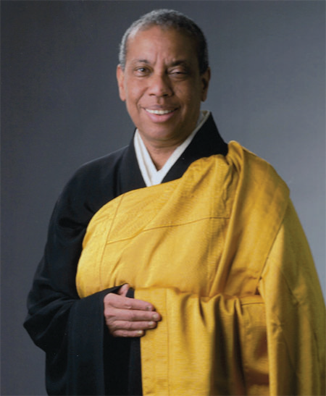 Roshi Merle Kodo Boyd (1944-2022) passed peacefully at her home in Durham, NC, on Sunday, February 20, 2022. She was beloved for her keen wisdom, gentle kindness, and big love. Possessed of a fierce and independent spirit, Kodo was the first fully transmitted African American Zen teacher in the United States. Her life as a Black woman, particularly those experiences that shaped her throughout her childhood in a segregated but nurturing community in Houston, TX, and her life in the buddhadharma were intimately interwoven. She was of fond of saying, “You can’t fall out of your life.”
Roshi Merle Kodo Boyd (1944-2022) passed peacefully at her home in Durham, NC, on Sunday, February 20, 2022. She was beloved for her keen wisdom, gentle kindness, and big love. Possessed of a fierce and independent spirit, Kodo was the first fully transmitted African American Zen teacher in the United States. Her life as a Black woman, particularly those experiences that shaped her throughout her childhood in a segregated but nurturing community in Houston, TX, and her life in the buddhadharma were intimately interwoven. She was of fond of saying, “You can’t fall out of your life.”
Kodo first began Zen sitting on her own in the 1980s, when a picture of a Chinese painting of a solitary angler awakened a deep recognition in herself. She sat alone for a few years before traveling to Yonkers, NY, to study at the Zen Community of New York, led by Roshi Bernie Glassman and Roshi Sandra Jishu Holmes. She received jukai, the Buddhist precepts, and tokudo, ordination as a Zen Buddhist priest, from Holmes in 1996. Around that time, she met her Zen teacher Roshi Egyoku Nakao and began making extended trips to the Zen Center of Los Angeles for study and training. In 1994, with two other practitioners, Bill Nordahl and Peter Nyodo Ott, she co-founded the Lincroft Zen Sangha in New Jersey, for which she remained the Guiding Teacher at the time of her passing. In 2002, Kodo completed her Priest training and was empowered by Roshi Nakao in 2006 as a Zen Teacher in the Maezumi/Glassman line of the White Plum Zen lineage. In 2011, Kodo served as the Abbot Seat Holder of ZCLA during Nakao’s sabbatical year. In 2015, she received Inka (Seal of Approval) and the title Roshi. She was also active in interfaith dialogue and travelled together with her teacher to Bearing Witness Retreats at Auschwitz Berkinau, the Native American Bearing Witness Retreat, SD, and at the Tule Lake Japanese-American Concentration Camp in California.
Kodo received a Master’s Degree in Early Childhood Education from New York University and a Master’s Degree in Social Work from Hunter College in New York City. She worked as a clinical social worker and therapist, primarily with veterans of the Vietnam War in Middletown, NJ. She is survived by her husband, Ken Boyd, daughter Malaika, and her many Dharma brothers and sisters.
References:
Malgosia Jiho Braunek | 1947 — 2014
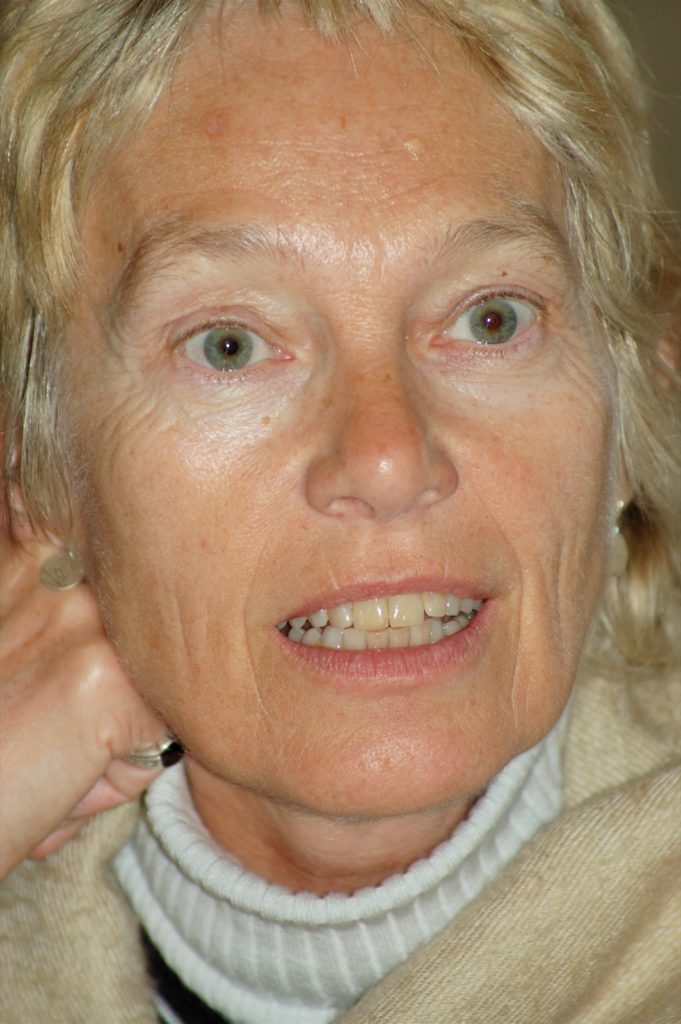 Małgorzata Braunek (January 30, 1947–June 23, 2014) was a Polish film and stage actress. In 1969, she graduated at Ludwik Solski Academy for the Dramatic Arts in Warsaw.She began the practice of Korean Zen with Master Dae San Sa Nim in 1979. She practiced with Genpo Roshi since 1983, and since 1986, he had been her main teacher.
Małgorzata Braunek (January 30, 1947–June 23, 2014) was a Polish film and stage actress. In 1969, she graduated at Ludwik Solski Academy for the Dramatic Arts in Warsaw.She began the practice of Korean Zen with Master Dae San Sa Nim in 1979. She practiced with Genpo Roshi since 1983, and since 1986, he had been her main teacher.
Beginning in 1992, she led the Polish sangha Kanzeon. She was a member of Kanzeon, the White Plum Asanga, and the Zen Peacemakers Order.
In 2003, she received Dharma Transmission from Genpo Roshi and the title of Sensei. In 2011, she received the title of Roshi (Zen Master).
She also received authorization to teach methods of Big Mind Big Heart from Genpo Roshi. She also studied with Genno Roshi, Roshi Bernie and with teachers of other, non-Buddhist spiritual traditions .
She was the Polish Co-founder of the Community of Peace in which under the leadership of Roshi Bernie for many years co-organized Bearing Witness Meditations at Auschwitz.
She has also worked as a volunteer in the Warsaw oncology hospice .
On June 23, 2014, Braunek died from cancer at the age of 67.
John Daishin Buksbazen | 1939 — 2022
 Sensei Daishin was born in 1939 in London, England, to a Jewish-Christian family of Eastern European backgrounds. He began Zen practice in Philadelphia in 1967, receiving both lay and Priest ordination in the Korean Chogye Order of Zen from the Venerable Seo Kyung-bo. He later practiced with (then) Maezumi Sensei at the Zen Center of Los Angeles (ZCLA), where he was in residence until 1979. He served as pastoral counselor, and was publishing editor of the ZCLA Journal and the Zen Writings Series.
Sensei Daishin was born in 1939 in London, England, to a Jewish-Christian family of Eastern European backgrounds. He began Zen practice in Philadelphia in 1967, receiving both lay and Priest ordination in the Korean Chogye Order of Zen from the Venerable Seo Kyung-bo. He later practiced with (then) Maezumi Sensei at the Zen Center of Los Angeles (ZCLA), where he was in residence until 1979. He served as pastoral counselor, and was publishing editor of the ZCLA Journal and the Zen Writings Series.
In 1999, Daishin renewed his Priest vows with Yoshin Jordan, and returned to ZCLA to study with Abbot Egyoku Nakao. In 2003 he received Preceptor Transmission and was empowered as Dharma Holder, and subsequently received Dharma Transmission in June 2008.
Sensei Daishin earned a PsyD in Psychology from the Southern California Psychoanalytic Institute. He was a licensed Marriage and Family Therapist with a private clinical practice. He founded an affiliated sitting group, the Ocean Moon Sangha, in Santa Monica and taught Buddhist psychology and zazen to mental health professionals. Daishin was the author of To Forget the Self and Zen Meditation in Plain English (Wisdom, 2002) and was co-editor with Roshi Egyoku of the On Zen Practice collection. He was married to Concetta Getsuren Alfano, a Zen practitioner, psychoanalyst and co-founder of the Center for Mindfulness and Psychotherapy. Daishin had one son.
Mitchell Doshin Cantor | 1935 — 2021
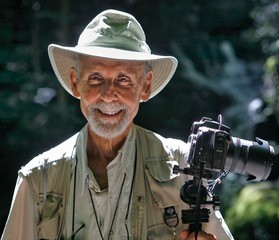 Mitchell Doshin Cantor established Southern Palm Zen group in 1995 as a place where the local community could come to meditate, whether they were Buddhist or not.
Mitchell Doshin Cantor established Southern Palm Zen group in 1995 as a place where the local community could come to meditate, whether they were Buddhist or not.
Soon after, Doshin responded to a letter from an inmate in Florida who needed help to get the Florida DOC to recognize Buddhism as a valid tradition. He lobbied the DOC to allow Buddhist inmates to meet together in the prison chapel and to possess traditional items such as mala beads for their religious practice. He recruited volunteers around the state who would be willing to go “inside” and teach Buddhism to interested inmates. In 2007 he began a monthly teaching newsletter which was mailed to interested inmates throughout the DOC. Today our monthly prison mailing reaches almost 400 men.
Doshin received transmission from Muryo Matthiessen Roshi, studied with Bernie Glassman Roshi and Sensei Madeline Koi-Bastis. Doshin has given transmission to four of his students and offered jukai to dozens of others.
Doshin graduated from Tufts University and had a career as a periodontist. He also had a passion for photography. You can view his exceptional work on online at: ListeningWithTheEye.com. Doshin was a loving husband, father of four, grandfather of six.
Doshin will be remembered by all for his wisdom and his kindness, his devotion to his family, his gregarious nature, his brilliant mind, his passion for learning, his contemplative photography, and his dedication to the dharma.
Barbara Shoshin Craig | R.S.M., 1932 — 2022
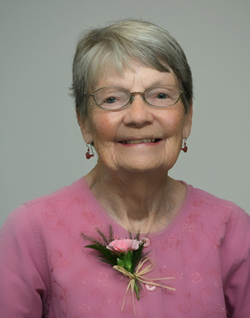 Barbara Soshin Craig , a sister of Mercy, began her study of zen in the early 90’s under the direction of Roshi Janet Jinne Richardson, csjp. Janet, along with Sensei Rosalie Jishin McQuaide, csjp., founded the Zen Community of Baltimore/Clare Sangha, and it was with this group that Barbara worked very closely. In 1997, as an apprenticing teacher, Barbara and Stephanie Olek, a Sister of Mercy, started a zen group in Wilkes-Barre, PA. Soon after, the group became known as the Flowing River Sangha. In June of 2002, Barbara was installed as a zen teacher (Sensei) with the Dharma name of Shoshin. She is Dharma Successor of Roshi Janet Jinne Richardson in the lineage of the White Plum Asanga. Barbara’s life as a Sister of Mercy for over fifty years has included teaching Spanish, prison ministry, ministry among migrant farm workers, and involvement in various social outreach programs. Presently, along with the zen work, she continues as a peace and justice advocate in the local area and with the sisters of Mercy.
Barbara Soshin Craig , a sister of Mercy, began her study of zen in the early 90’s under the direction of Roshi Janet Jinne Richardson, csjp. Janet, along with Sensei Rosalie Jishin McQuaide, csjp., founded the Zen Community of Baltimore/Clare Sangha, and it was with this group that Barbara worked very closely. In 1997, as an apprenticing teacher, Barbara and Stephanie Olek, a Sister of Mercy, started a zen group in Wilkes-Barre, PA. Soon after, the group became known as the Flowing River Sangha. In June of 2002, Barbara was installed as a zen teacher (Sensei) with the Dharma name of Shoshin. She is Dharma Successor of Roshi Janet Jinne Richardson in the lineage of the White Plum Asanga. Barbara’s life as a Sister of Mercy for over fifty years has included teaching Spanish, prison ministry, ministry among migrant farm workers, and involvement in various social outreach programs. Presently, along with the zen work, she continues as a peace and justice advocate in the local area and with the sisters of Mercy.
Rose Mary Myoan Dougherty | 1939 — 2019
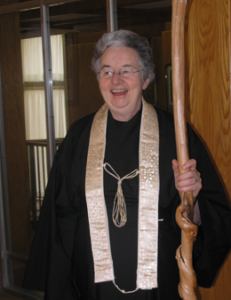 Rose Mary Myoan Dougherty Sensei was the founder and first guiding teacher of One Heart Sangha/Silver Spring Zendo in Maryland. She also served for a time on the Board of Directors of the White Plum Asanga. A vowed member of the School Sisters of Notre Dame, she began her Zen studies with Charlotte Joko Beck in the 1990s and received dharma transmission in 2006 from Janet Jinne Richardson Roshi. A longtime hospice volunteer, she completed the End of Life Counseling Program at the Metta Institute in California and was the co-founder of Companioning the Dying. She ministered for over thirty years in the area of contemplative spirituality, offering retreats, workshops and spiritual direction in multi-faith/ecumenical settings, especially through her work at the Shalem Institute for Spiritual Formation in Bethesda, MD. She was Shalem’s Retired Senior Fellow for Spiritual Guidance and for many years directed Shalem’s graduate-level program in Spiritual Guidance. She was the author of Discernment (2009), and Group Spiritual Direction (1995).
Rose Mary Myoan Dougherty Sensei was the founder and first guiding teacher of One Heart Sangha/Silver Spring Zendo in Maryland. She also served for a time on the Board of Directors of the White Plum Asanga. A vowed member of the School Sisters of Notre Dame, she began her Zen studies with Charlotte Joko Beck in the 1990s and received dharma transmission in 2006 from Janet Jinne Richardson Roshi. A longtime hospice volunteer, she completed the End of Life Counseling Program at the Metta Institute in California and was the co-founder of Companioning the Dying. She ministered for over thirty years in the area of contemplative spirituality, offering retreats, workshops and spiritual direction in multi-faith/ecumenical settings, especially through her work at the Shalem Institute for Spiritual Formation in Bethesda, MD. She was Shalem’s Retired Senior Fellow for Spiritual Guidance and for many years directed Shalem’s graduate-level program in Spiritual Guidance. She was the author of Discernment (2009), and Group Spiritual Direction (1995).Patrick Kundo Eastman | 1937 - 2023
 When Father Patrick Eastman received Dharma transmission from Father Robert Jinsen Kennedy Roshi, he could not have been given a more apt Dharma name: ‘Kundo’, for it means, ‘No Way’ or ‘Pathless Path’. As a Dharma name, this resonates, of course, with the practice of Zen in a precise and specific way, but it also wonderfully captured the essence and nature of Patrick Kundo’s whole life, which unfolded in seemingly unlikely, improbable and unexpected ways. It was a name which both expressed what his life had been up to that point, and also one into which he grew more and more as he aged, since it beckoned him with the invitation held out to all Zen practitioners to be truly and unequivocally ourselves and not someone else.
When Father Patrick Eastman received Dharma transmission from Father Robert Jinsen Kennedy Roshi, he could not have been given a more apt Dharma name: ‘Kundo’, for it means, ‘No Way’ or ‘Pathless Path’. As a Dharma name, this resonates, of course, with the practice of Zen in a precise and specific way, but it also wonderfully captured the essence and nature of Patrick Kundo’s whole life, which unfolded in seemingly unlikely, improbable and unexpected ways. It was a name which both expressed what his life had been up to that point, and also one into which he grew more and more as he aged, since it beckoned him with the invitation held out to all Zen practitioners to be truly and unequivocally ourselves and not someone else.
Born in 1937 into modest circumstances in North Devon in the West of England, Patrick Kundo Roshi contracted Tuberculosis at the age of 15, which seriously interrupted his education for over a year, necessitating his isolation within the walls of a sanitorium. The physical weaknesses resulting from this illness continued to affect him right up to his death in 2023. It was while he was recovering, however, that he met his future wife, Maureen, who had also contracted Tuberculosis, and they were married when they were just 20 years old. It was a wonderfully happy marriage, which lasted until Maureen’s death in 2019, following a slow and steady decline as a consequence of living with Vascular Dementia. They produced three children and subsequently delighted in being grandparents and great-grandparents.
Having been brought up in the Church of England, Patrick Kundo Roshi drifted away during his teenage years, only to be drawn back in his early twenties. He began to sense that he should be ordained as a priest but could not see how this was possible, given his minimal educational attainment. Ultimately, however, he was enabled to proceed to St Stephen’s House, Oxford, to begin his formal training. His time there nurtured his intellectual curiosity and spiritual adventurousness, both of which led him to discover the writings of the Roman Catholic Trappist monk, Thomas Merton, who was himself much influenced by Zen.
In the years that followed, Patrick Kundo Roshi gradually began to feel himself being drawn to the Roman Catholic Church and made the decision to renounce his Anglican orders and be received into the Roman Catholic Church as a layperson. A chance encounter with the Bishop of Detroit, though, eventually brought him into contact with the Bishop of Tulsa in Oklahoma, who said that he would respect his experience as an Anglican priest and that he would be prepared to ordain him – a married man with a family – as a Roman Catholic priest. Patrick Kundo Roshi must have been one of the first, if not the first, of such people in modern times, to have been so ordained in the Roman Catholic Church since the early centuries of the church, when there were married clergy.
What followed was a very fruitful ministry as the Director of Spirituality for the Diocese of Tulsa, which involved him in establishing a Diocesan Centre of Prayer. One of the features of this Centre was the formation of numerous contemplative prayer groups across the Diocese, which were eventually drawn together in a more formal way as the Monos Community, for which Patrick Kundo Roshi created and edited a journal, which was published on a regular basis.
Patrick Kundo Roshi had aways been interested in and drawn to the monastic life and it was at Osage Monastery, a Benedictine community of men and women, where, in addition to his work as the Diocesan Director of Spirituality he became Chaplain to the Osage Community, that he was able to give expression to this aspect of his life. Two encounters here were of particular significance. The first, when visiting the Monastery, was with Fr Bede Griffiths, the English Roman Catholic Benedictine monk, who had left England at the age of 49 to live the rest of his life in India, in order, as he said, to ‘find the other half of my soul’. The second was with Ruben Habito Roshi, a former Jesuit priest, who had begun practising Zen, while he was a missionary in Japan, under the guidance of Koūn Yamada Roshi. It was this latter meeting that really launched Patrick Kundo Roshi on his own formal practice of Zen, and Ruben Habito Roshi was his first teacher. In time he would also come to study with John Daido Loori Roshi (and Patrick Kundo Roshi was deeply influenced by and always remained grateful for his association with Zen Mountain Monastery), Bernie Tetsugen Glassman Roshi and, finally, Robert Jinsen Kennedy Roshi, who gave him Dharma Transmission, followed later by Inka.
Patrick Kundo Roshi and Maureen returned to England in 2004 for their retirement, but Patrick Kundo Roshi was not one to let the grass grow under his feet. He immediately began introducing the practice of Zen to anyone who showed an interest and before long he had established a small group in Cirencester in Gloucestershire, near to where he and Maureen lived. As word spread about his teaching and practice, people began to contact him from far and wide, and before too long other groups were being formed around the country under his guidance. Part of his legacy is the existence of numerous groups, ranging geographically from Sussex in the Southeast of England, right up to Edinburgh in Scotland. This growth was facilitated and enhanced by the way in which Patrick Kundo Roshi identified potential teachers. In time he gave Transmission to three of his students – Marcus Hozan Averbeck, Jeremy Ryokan Woodcock and Christopher Ryushin Collingwood – who between them have themselves either given Transmission to students or have students in training to be teachers. Patrick Kundo Roshi would no doubt have been astonished and delighted to see the Wild Goose Zen Sangha, which he founded, to be thriving and growing.
Patrick Kundo Roshi could sometimes be a little irascible and stubborn and once he got a bee in his bonnet about something, there was no letting it go! The positive side of this, though, was that he would stand no nonsense, and in dokusan he could be challenging when necessary, always ready, like any good Zen teacher, to expose all the escape routes and subterfuges his students sought to employ to hide from their delusions. Above all, though, he was a wise, compassionate, loving, encouraging, affirming, trusting and gentle teacher, who encouraged all his students to see that, like him, we are all truly Kundo, for whom there is No Way and only a Pathless Path.
John Shodo Flatt | 1913 — 1994
 John Shodo Flatt was one of the founders of the British White Plum Sangha. He was the chairman of the Zen Practice Centre Trustees . He received shiho from Genpo Merzel in the year he died
John Shodo Flatt was one of the founders of the British White Plum Sangha. He was the chairman of the Zen Practice Centre Trustees . He received shiho from Genpo Merzel in the year he diedBernie Tetsugen Glassman | 1939 — 2018
 Zen Master Bernie Glassman was a world-renowned pioneer in the American Zen Movement. He was a spiritual leader, published author, accomplished academic and successful businessman.
Zen Master Bernie Glassman was a world-renowned pioneer in the American Zen Movement. He was a spiritual leader, published author, accomplished academic and successful businessman.
Bernie was born in Brooklyn, New York in 1939. His parents were immigrants from Eastern Europe and he grew up in a Jewish family with a strong socialist orientation. His mother’s Hebrew name was Chana and father’s name was Otto, though he used the name Albert with family. Bernie’s Hebrew name was Benyamin.
After graduating from Brooklyn Polytechnic Institute, he went to work for McDonnell-Douglas in California in 1960 as an aeronautical engineer, concentrating on interplanetary flights. He obtained a Ph.D. in Applied Mathematics from UCLA in 1970.
Bernie spent decades teaching Zen and working in Socially Engaged Buddhism, founding Zen Peacemakers in 1996 and developing Bearing Witness Retreats. He passed away in Massachusetts USA on November 4th, 2018 from natural causes. It was the eve of the 23rd Zen Peacemakers Auschwitz-Birkenau Bearing Witness Retreat.
He is survived by his wife Roshi Eve Marko, his daughter Alisa, son Marc, sister Sally Blatter, brother-in-law Hy Blatter, his first wife Helen Harkaspi, many cousins, nephews and nieces, and four grandchildren.
Zen Master Bernie Glassman was a world-renowned pioneer in the American Zen Movement. He was a spiritual leader, published author, accomplished academic and successful businessman.
Bernie was born in Brooklyn, New York in 1939. His parents were immigrants from Eastern Europe and he grew up in a Jewish family with a strong socialist orientation. His mother’s Hebrew name was Chana and father’s name was Otto, though he used the name Albert with family. Bernie’s Hebrew name was Benyamin.
After graduating from Brooklyn Polytechnic Institute, he went to work for McDonnell-Douglas in California in 1960 as an aeronautical engineer, concentrating on interplanetary flights. He obtained a Ph.D. in Applied Mathematics from UCLA in 1970.
Bernie spent decades teaching Zen and working in Socially Engaged Buddhism, founding Zen Peacemakers in 1996 and developing Bearing Witness Retreats. He passed away in Massachusetts USA on November 4th, 2018 from natural causes. It was the eve of the 23rd Zen Peacemakers Auschwitz-Birkenau Bearing Witness Retreat.
He is survived by his wife Roshi Eve Marko, his daughter Alisa, son Marc, sister Sally Blatter, brother-in-law Hy Blatter, his first wife Helen Harkaspi, many cousins, nephews and nieces, and four grandchildren.
Robert Kaku Gunn | 1943 — 2021
 Robert Kaku Gunn first received the precepts from John Daido Loori in May of 1993 and was given the Dharma name, Jingen, meaning “God is the source of my life.” He joined the Village Zendo in 2001, then received the precepts from Enkyo Roshi in 2005, who gave him the Dharma name KaiZen, “revealing Zen.” In 2012 she ordained him a Soto Zen priest and gave him the name of Kaku—”Song of Emptiness.”
Robert Kaku Gunn first received the precepts from John Daido Loori in May of 1993 and was given the Dharma name, Jingen, meaning “God is the source of my life.” He joined the Village Zendo in 2001, then received the precepts from Enkyo Roshi in 2005, who gave him the Dharma name KaiZen, “revealing Zen.” In 2012 she ordained him a Soto Zen priest and gave him the name of Kaku—”Song of Emptiness.”
After 38 years as a Christian pastor of churches in Maine, Boston and New York in the United Church of Christ, in December of 2017, Kaku became the Guiding Teacher for the Empty Hand Zen Center in New Rochelle, N.Y. In March of 2019, Enkyo Roshi gave him dharma transmission.
Kaku Sensei was a frequent speaker and retreat leader on Buddhist/Christian Dialogue and is the author of Journeys Into Emptiness: Dōgen, Merton and Jung and The Quest for Transformation (Paulist Press, 2000), as well as a two-volume autobiography, One Bright Pearl: An Unholy Memoir, vol. 1, and One Bright Pearl: God is the Source of My Life, vol. 2 (Amazon, 2017). With Roshi Enkyo O’Hara, Kaku is the subject of a video, One Body, One Heart, in which Roshi and he discuss the role of his Zen practice in meeting the challenge of cancer.
As a psychotherapist in private practice on the Upper West Side of New York, Kaku also served as adjunct faculty at Union Theological Seminary and New York Theological Seminary for twenty years. In April of 2019, Kaku relocated to Virginia Beach, Virginia to live near his daughters and establish a new Zen practice center.
Kaku said, “I live in deep gratitude for the gift of Zen practice and most especially for the experience of being raised in the Zen family of the Village Zendo under Enkyo Roshi O’Hara. When I first came to practice with her, I was full of mistrust and told her I didn’t trust anyone, especially myself. She said, ‘I hope you will let us love you.’ And I did. And they did. Unending bows for an unending practice!”
Pia Jinji Gyger | 1940 — 2014
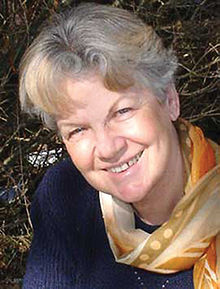 Pia Jinji Gyger was a Swiss specialist for special education, psychologist and a Zen master of the White Plum Sangha lineage. She was co-founder of the Lassalle-Institute within the Lassalle-House in Bad Schönbrunn/Zug, Canton of Zug. She was co-initiator of the Jerusalem-Project.
Pia Jinji Gyger was a Swiss specialist for special education, psychologist and a Zen master of the White Plum Sangha lineage. She was co-founder of the Lassalle-Institute within the Lassalle-House in Bad Schönbrunn/Zug, Canton of Zug. She was co-initiator of the Jerusalem-Project.
Gyger studied 1972–1976 special education (i.e. education, training, raising and promotion of children and young persons with development impairments and handicaps) and psychology at the Zurich University of Applied Sciences.
In the years 1976–1999 she was educated in Zen in Kamakura, Kanagawa/Japan with Hugo Makibi Enomiya-Lassalle and Yamada Kôun Roshi in Hawaii. She received Dharma transmission from Aitken Rōshi and was also taken up in the Buddhist Peace Fellowship to co-operate in international peace projects. In 1999 she was confirmed as Zen master (“inka shōmei”) by Tetsugen Bernard Glassman.
In 1969 Gyger joined the ecumenical community with inter-religious orientation Saint Katharina-Werk, Basel. On behalf of the Federal Department of Justice and Police she founded 1976 a therapy home near Horw for particularly difficult young persons which she led until 1982. Subsequently she was nominated general leader of the Saint Katharina-Werk. In 1986 she founded a project for meetings of the world’s religions and 1989 she initiated in a slum on the outskirts of Manila a school for the spiritual and political awareness of young people. 1995, back in Switzerland, she founded together with Niklaus Brantschen the Lassalle-Institute of Zen – Ethics – Leadership which they led until 2002 and at which she is teaching. Brantschen and she founded in 2003 the Lassalle-Zen-line and the school of contemplation „Via Integralis“. After that they developed the project Jerusalem – Open town for learning of the peace in the world which is accredited at the UN and leads them regularly to Jerusalem and to New York.
Jules Shuzen Harris | 1939 — 2023
 Psychotherapist and Soto Zen priest Roshi Jules Shuzen Harris passed away at his home in Lansdowne, Pennsylvania on Monday, May 8 after a prolonged period of complicated health issues.
Psychotherapist and Soto Zen priest Roshi Jules Shuzen Harris passed away at his home in Lansdowne, Pennsylvania on Monday, May 8 after a prolonged period of complicated health issues.
Shuzen Roshi was the founder and abbot of Soji Zen Center in Lansdowne, Pennsylvania. In an announcement of his death shared by the center, Sensei John Ango Gruber writes:
Yesterday, after a prolonged period of complicated health issues, our beloved teacher and Soji founder Roshi Jules Shuzen Harris passed away at home in Lansdowne. I have been incredibly moved by Roshi’s conviction to keep showing up, week after week, to sit with us, chant with us, see students in interviews, and offer the teachings of the Dharma in both his words and his example. It was not easy in these recent months, but he would not be deterred!
For years, we have been united by a shared love for our teacher and a connection forged by the ways that he has been so influential to so many of us. I have listened to many of you speak in council circle often about a way that Shuzen Roshi guided you, challenged you, offered you support or compassion, saw something in you that you may not have seen in yourself, and encouraged you to go deeper in your Zen practice and commitment.
I can also say with absolute clarity that all of you have meant so much to Shuzen Roshi, that he has profoundly appreciated your support for Soji, your dedication to practice, and your willingness to come back again and again to a place of grateful acceptance alongside consistent effort. Roshi said many times, “You all are my practice,” and indeed we have been.
As shared by Village Zendo, Shuzen Roshi practiced Buddhism for nearly 40 years, receiving Denkai in May 2002 from Genpo Roshi, Abbot of Kanzeon Zen Center. He received Hoshi, Shiho, and Inka from Roshi Pat Enkyo O’Hara.
He was a member of the Zen Peacemakers Sangha, The Soto Zen Buddhist Association, as well as the American Zen Teachers Association, and held an Ed.D. with a concentration in applied human development.
“As a psychotherapist,” Village Zendo writes, “Shuzen found creative ways to synthesize Western psychology and Zen to achieve dramatic results with his patients and students. He also focused on the relationship between Zen and the martial arts. He held black belts in Iaido (the art of drawing and cutting with a samurai sword) and in Kendo (Japanese fencing). Shuzen founded two Japanese swordsmanship schools in Albany, NY and Salt Lake City, UT.”
Lex jikai Hixon | 1941 — 1995
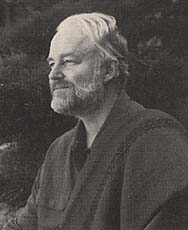 Lex Jikai, also known as Nur al-Anwar al-Jerrahi in the Sufi community, was an American Sufi author, poet, and spiritual teacher. He practiced and held membership in several of the world’s major great religious traditions, and documented his spiritual explorations in nine books and many articles and teachings given to various groups. His passionate conviction that all of the great religions are true was sparked by his study of the life and teachings of Sri Ramakrishna, and he made his life a witness to this belief by fully immersing himself in multiple religious practices and studies, not as a research project but as an act of faith.
Lex Jikai, also known as Nur al-Anwar al-Jerrahi in the Sufi community, was an American Sufi author, poet, and spiritual teacher. He practiced and held membership in several of the world’s major great religious traditions, and documented his spiritual explorations in nine books and many articles and teachings given to various groups. His passionate conviction that all of the great religions are true was sparked by his study of the life and teachings of Sri Ramakrishna, and he made his life a witness to this belief by fully immersing himself in multiple religious practices and studies, not as a research project but as an act of faith.
Hixon was born on December 25, 1941 in Pasadena, California, one of three sons of Alexander and Adelaide Hixon. He married his second wife, Sheila, in 1965; they had two daughters and one son: Shanti, India, and Dylan. Hixon also had a daughter, Alexandra, from a previous marriage with Margaret Taylor. He graduated from Yale University in 1963, where he majored in philosophy, and received a PhD in comparative religion from Columbia University in 1976. His doctoral thesis was on the Gaudapada Karika, a Sanskrit scripture of the very early Advaita Vedanta school of Hindu philosophy, bringing out Buddhist influences.
Sandra Jishu Holmes | 1941 — 1998
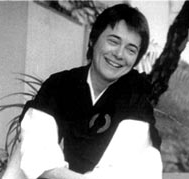
Jishu was born in California in 1941. She came out East, went to Columbia University and became a biochemist. She did early research in the AIDS disease that was only then being identified and diagnosed. And she was a seeker. At first she pursued Vedanta and followed the teachings of Ramana Maharshi. She went to visit his ashram in India and continued to practice in New York, even teaching herself Sanskrit. Finally, around 1981, she left her work and came to live at the Zen Community of New York in Riverdale. In addition to a regular schedule of meditation, study and retreats, the Community had already begun a business, a bakery, and its next steps were in the direction of social action.
She ordained as a priest and in 1986, she was named the director of the Greyston Family Inn,. The mission of the Greyston Family Inn was to build apartments for homeless families, mostly single mothers with children. She built apartment buildings and day care centers. When Greyston got involved in AIDS work she did the initial research to get the Certificate of Need from the government. That AIDS center is today a national model in this country for effective, compassionate work with people with AIDS. She became a Zen teacher and ultimately co-founded the Zen Peacemaker order.
Anjo Koren Kasman | 1956 — 2016
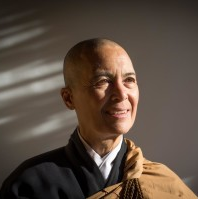 Anjo Koren Kasman Sensei (1956 – 2016) studied business economics and worked as an administrative manager in an Academic Hospital in Leiden, the Netherlands. She started Zen practice with Tenkei Roshi in 1999. Koren Sensei has been a resident at Zen River for almost 15 years, where she worked as Zen River’s financial manager. Also for many years she was the head of the sewing room, one of the nerve centers of the temple. She received Tokudo in 2002 and was Shuso during Ango in 2006. She was Shuso again in 2011 with Hojo-san as Jokeshi for her Hossenshiki. She has been leading workshops and classes since 2008. She received Shiho from Tenkei Roshi in December 2013 and completed her formal training in Japan in July 2015. Together with Gakudo Sensei she did Zuise in Eiheiji and Sojiji, the two head temples in Japan, and is fully qualified by the Japanese Soto School. She is together with her husband Gakudo one of the founders of Keiryuji. We will miss her enthusiasm, compassion and possitive outlook on life.1
Anjo Koren Kasman Sensei (1956 – 2016) studied business economics and worked as an administrative manager in an Academic Hospital in Leiden, the Netherlands. She started Zen practice with Tenkei Roshi in 1999. Koren Sensei has been a resident at Zen River for almost 15 years, where she worked as Zen River’s financial manager. Also for many years she was the head of the sewing room, one of the nerve centers of the temple. She received Tokudo in 2002 and was Shuso during Ango in 2006. She was Shuso again in 2011 with Hojo-san as Jokeshi for her Hossenshiki. She has been leading workshops and classes since 2008. She received Shiho from Tenkei Roshi in December 2013 and completed her formal training in Japan in July 2015. Together with Gakudo Sensei she did Zuise in Eiheiji and Sojiji, the two head temples in Japan, and is fully qualified by the Japanese Soto School. She is together with her husband Gakudo one of the founders of Keiryuji. We will miss her enthusiasm, compassion and possitive outlook on life.1
Philip Sengetsu Kolman | 1939 — 2020

Phil Kyosei Sengetsu Kolman, Sensei, was a Dharma Teacher, Full Priest and Chaplain. Married to Marsha for 29 years, he has three daughters from a previous marriage. He was engaged in intensive Zen training for the 19 years, first at ZMM from 1994 until 2004, where he was a student of Roshi John Daido Loori. He received Jukai from Daido Roshi in 1997 and was given the name Kyosei.He assisted Sensei Bonnie Myotai Treace in founding Fire Lotus Temple in Brooklyn, and continued to practice under her guidance at Fire Lotus and after her departure from the Mountains and Rivers Order in 2004 when she formed Hermitage Heart Sangha. Kyosei served on the Board of Directors as Treasurer of Hermitage Heart, and Sensei gave him his primary dharma name, Sengetsu in a Jukai Ceremony there.
That same year he and Marsha moved to Pennsylvania, and Phil joined the Buddhist Sangha of Bucks County and held training and teaching responsibilities with them.
In 2008 Sensei Myotai became too ill to continue full time teaching for awhile; on her recommendation Phil joined High Mountain Crystal Lake Zen Community where he began studying with Roshi Bill Jikai Greenberg and Roshi Paul Genki Kahn. He was ordained as a Novice Priest (Tokudo) in December of 2009. He served as Head Trainee (Shuso) at Fall Ango, 2010 and was made a Dharma Holder. He completed Denkai in December of 2011 and was empowered as a Full Priest. He completed the Pastoral Counseling and Chaplaincy Program in April of 2012. In June of 2014 he recieved Transmission from Paul Genki Khan, Roshi.
“In my 19 years of intense Zen training, I have studied and held a variety of positions from Monastery Cook through all the liturgical instruments and roles to Zendo Coordinator. I have studied and practiced many Zen Arts in depth. For many years I have studied shakuhachi with Grand Master Ronnie Nyogetsu Selden, and had a public debut at the Kyoto Art Museum in Japan. I wrote haiku poetry under the tutelage of Clark Strand. I learned the nurture and training of bonsai with Chase and Solidad Rosade at the Chase Rosade Studio in Pennsylvania. I practiced Urasenke Chanoyu (Tea Cerimony) at La Salle University in Philadelphia and had taken a number of other Zen intensives over the years in areas of photography, Zen archery, pottery, Buddhist academic studies, and calligraphy. I have held teaching positions in a number of organizations as well as pastoral counseling and Chaplaincy duties in Buddhist Sanghas, 55 and over adult communities, Gilda’s Club in NYC, Columbia University Hospital’s cancer center and store front sitting groups.”
In Phil’s “other life,” he was an engineer who founded a medical electronics company and was granted equipment patents in medical instrumentation for blood analysis. He has held management positions in a number of electronics engineering and manufacturing companies. He was Vice President and General Manager of United Burglar Alarm Corporation for 28 years and served as an Expert Witness in the field of security.
High Mountain Crystal Lake was associated with the Zen Peace Makers with Roshi Bernie Glassman . Phil served for a short time as assistant Treasurer for the Zen Peace makers . He and Bernie were the same age both grew up in Brooklyn. Later High Mountain Crystal Lake became Zen Garland where Phil was on their board of directors as Treasurer.
Robert Sokan Lee | 1926 — 2018

photo by Peter Cunningham
Bob Lee received his MD at the University of Michigan. He practiced as a pediatrician for 8 years, then completed residency in psychiatry in Berkeley. He practiced as a family therapist for 35 years, and was Chief of Kaiser Permanente in-patient and out-patient psychiatry for many years. A Zen Buddhist since 1968, Bob studied meditation practice with Yasutani Roshi. Another major teacher was Koryu Osaka Roshi, and Bob also was a student of Maezumi Roshi and Soen Nakagawa Roshi. Bob continues to study with Roshis Genpo Merzel and Bernie Glassman, and has served on their organizations’ Boards of Directors. He is a founding member of the Bay Area Peacemaker Circle. Bob was named as the first Elder in the Zen Peacemaker Sangha.
Marli Jifu Daigen Lindeboom | 1950 - 2022
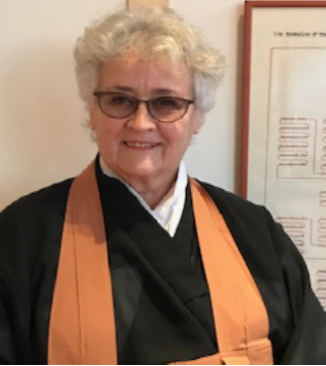 Marli was born on March 22, 1950, in Den Haag, the Netherlands, as the youngest member of a family that suffered during WW II in the imprisonment camps in Indonesia. After the war the family lived for some years in Singapore and moved to The Netherlands in the early 50’s. Not long after they returned, the parents divorced and her brother and sister, more then 10 years older, went to boarding school. The child Marli stayed alone with her mother. As an adult woman she married, had three children and divorced when the kids were still young. In her working life she became head of a nursing home for old people, and later had a practice as physiotherapist and as haptotherapist.
Marli was born on March 22, 1950, in Den Haag, the Netherlands, as the youngest member of a family that suffered during WW II in the imprisonment camps in Indonesia. After the war the family lived for some years in Singapore and moved to The Netherlands in the early 50’s. Not long after they returned, the parents divorced and her brother and sister, more then 10 years older, went to boarding school. The child Marli stayed alone with her mother. As an adult woman she married, had three children and divorced when the kids were still young. In her working life she became head of a nursing home for old people, and later had a practice as physiotherapist and as haptotherapist.
Marli started sitting in 1999 in Kanzeon Zencenter Rotterdam with Nico Tenko Tydeman roshi and received in 2011 Jukai from him with the name Jifu. Later she became a student of Gretha Jikai Myoshin Aerts roshi, received Tokudo, and in January 2019 Dharma transmission and the name Daigen.
Marli was a clear, playful and warm teacher. Her particular contribution to the sitting practice came from her profession as a haptotherapist: she was able to let students experience directly what it means to sit in Hara. She was an important and loyal anchor for Kanzeon Zencenter Rotterdam continuing when Helma Jifu Vulink Sensei became the spiritual leader in 2020.
For a long time Marli suffered from cancer, and in the last months she had to deal with pain, morphine and the knowledge of her coming death. Until the end she could keep an open mind and heart. She shared these experiences as long as possible and they became a great teaching for all of us.
Marli Jifu Daigen Lindeboom sensei, passed away on the 11th of January, 2022.
John Daido Loori | 1931 — 2009
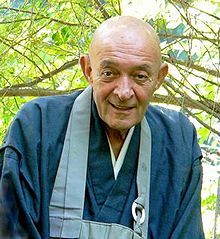
John Daido Loori was born in Jersey City, New Jersey and raised Roman Catholic. As a child Loori loved photographing things, once using his family’s bathroom as a makeshift dark room. He served in the U.S. Navy from 1947 to 1952. Later, after studying at Rutgers, he worked as a chemist in the food industry and led the American Civil Liberties Union in Orange and Sullivan Counties in New York. As an adult he distanced himself from Catholicism and explored a variety of other religions. Then, in 1971, he attended a workshop given by the photographer Minor White. Loori came to study photography under White until his death and also learned meditation from him. In 1972 Daido Loori began his formal Zen practice, studying in New York under Soen Nakagawa and then in California under Taizan Maezumi, Roshi.
In 1980 Loori purchased 230 acres (0.93 km2) in New York which today serves as the site for Zen Mountain Monastery. In 1983 he was made a Zen priest by Maezumi and in 1986 was given shiho (or, dharma transmission) by him. Loori was a professional nature photographer, having once exhibited his work at the American Museum of Natural History in Manhattan, New York. He has also held various other shows and workshops on photography, including positions at Naropa University starting in 1974 and the Synechia Arts Center located in Middletown, New York; his works have been published by Aperture and Time-Life. His book, Hearing with the Eye: Photographs from Point Lobos, features Loori’s abstract nature photography interwoven with commentary on Teachings of the Insentient by Eihei Dogen.
Loori founded Dharma Communications as a way to communicate the dharma of the Mountains and Rivers Order. Dharma Communications publishes a Buddhist quarterly titled the Mountain Record, various audio-visual materials, and has also published several books by Daido Loori. According to Charles S. Prebish, Dharma Communications is “one of the most efficient and successful publishers of Buddhist materials on the continent, and a place where practitioners can learn how to cultivate both mindfulness and compassion in front of a computer.”
Peter Muryo Matthiessen | 1927 — 2014
Peter Matthiessen1 (May 22, 1927 – April 5, 2014) was an American novelist, naturalist, wilderness writer and CIA agent. A co-founder of the literary magazine The Paris Review, he was the only writer to have won the National Book Award in both fiction and nonfiction. He was also a prominent environmental activist. Matthiessen’s nonfiction featured nature and travel, notably The Snow Leopard (1978) and American Indian issues and history, such as a detailed and controversial study of the Leonard Peltier case, In the Spirit of Crazy Horse (1983). His fiction was adapted for film: the early story “Travelin’ Man” was made into The Young One (1960) by Luis Buñuel and the novel At Play in the Fields of the Lord (1965) into the 1991 film of the same name.
In September of the following year came the field trip to Himalayan Nepal. Matthiessen later became a Buddhist priest of the White Plum Asanga. Before practicing Zen, Matthiessen was an early pioneer of LSD. He said his Buddhism evolved fairly naturally from his drug experiences. He argued that it was unfortunate that LSD had become outlawed over time, given its potentially beneficial effects as a spiritual and therapeutic tool (when administered with the right care and attention) and was critical of a figure such as Timothy Leary in terms of the long-term reputation of the drug.
In 1980, Matthiessen married Maria Eckhart, born in Tanzania, in a Zen ceremony on Long Island, New York. They lived in Sagaponack, New York. Eckhart is the mother of Serial host and Executive Producer Sarah Koenig, who was 10 or 11 years old at the time of the marriage.
In 2005, Matthiessen, along with Barry Lopez, Terry Tempest Williams, and James Galvin, was hailed in The Land’s Wild Music by Mark Tredinnick, which analyzed how the landscape nourished and developed Matthiessen’s writing.
Matthiessen was diagnosed with leukemia in late 2012. He died at his home in Sagaponack on April 5, 2014, aged 86.
1. “Peter Matthiessen.” 2017. Wikipedia. https://en.wikipedia.org/w/index.php?title=Peter_Matthiessen&oldid=787209435.
Hakuyu Taizan Maezumi | 1931 — 1995

The Venerable Hakuyu Taizan Maezumi, Roshi
The Venerable Hakuyu Taizan Maezumi (February 24, 1931 — May 15, 1995), a seminal influence on the growth of Zen Buddhism in the United States, was ordained as a Soto Zen monk at the age of eleven. He received degrees in Oriental Literature and Philosophy from Komazawa University and studied at Sojiji, one of the two main Soto monasteries in Japan. He received Dharma transmission from Hakujun Kuroda, Roshi, in 1955. He also received approval as a teacher (Inka ) from both Koryu Osaka Roshi, and Hakuun Yasutani Roshi.
In 1956, Maezumi Roshi came to Los Angeles as a priest at Zenshuji Temple, the Soto Headquarters of the United States. He devoted his life to laying a firm foundation for the growth of Zen Buddhism in the West. In1967, he established the Zen Center of Los Angeles. Its honorary founder is Baian Hakujun Daiosho, who headed the Soto Sect Supreme Court and was one of the leading figures of Japanese Soto Zen. Maezumi Roshi established six temples in the United States and Europe that are formally registered with Soto Headquarters in Japan. In addition to ZCLA, these include Zen Mountain Center in California; Zen Community of New York (Tetsugen Glassman, Abbot); Kanzeon Zen Centers of Salt Lake City, Utah and Europe (Genpo Merzel, Abbot); and Zen Mountain Monastery in New York (Daido Loori, Abbot). Affiliated centers also include the Great Mountain Zen Center in Colorado (Shishin Wick, teacher), Zen Community of Oregon (Chozen Bays, teacher); Three Treasures Zen Community in San Diego (Jikyo Miller, teacher); Centro Zen de Mexico, Coyoacan (Tesshin Sanderson, teacher), and Centro Zen de la Cuidad deMexico. In addition, there are over fifty groups in the Americas and Europe that are affiliated with ZCLA.
In 1976, Maezumi Roshi established the Kuroda Institute for the Study of Buddhism and Human Values, a non-profit educational organization formed to promote scholarship on Buddhism in its historical, philosophical, and cultural ramifications. The Institute serves the scholarly community by providing a forum in which scholars can gather at conferences and colloquia. The Institute also publishes a book series with the University of Hawaii Press devoted to the translation of East Asian Buddhist classics and presentations of scholarly works from its conferences. Maezumi Roshi also founded the Dharma Institute in Mexico City. Maezumi Roshi founded the White Plum Asanga, named after his father Baian Hakujun Daiosho.
He transmitted the Dharma to twelve successors: Bernard Tetsugen Glassman (NY), Dennis Genpo Merzel (UT & Europe), Charlotte Joko Beck (CA), Jan Chozen Bays (OR), John Daido Loori (NY), Gerry Shishin Wick (CO), John Tesshin Sanderson (Mexico), Alfred Jitsudo Ancheta (CA), Charles Tenshin Fletcher (CA), Susan Myoyu Andersen (IL), Nicolee Jikyo Miller (CA), and William Nyogen Yeo (CA). These twelve successors have further transmitted the Dharma to nine”second-generation” successors.
Don Ani Singer | 1935 — 2023
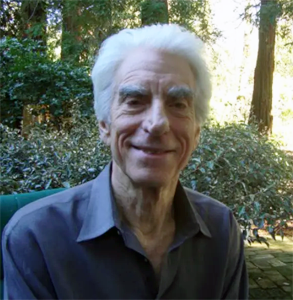
Cynthia Kin Ryu Taberner | 1959-2024

Cindy Kin Ryu Tabener co-founded Day Star Zendo in Franklin, Massachusetts, with the Zen teacher and Trappist monk and priest Kevin Jiun Hunt, OSCO, Roshi, one of the participants in the earliest sustained dialogues among Catholic and Zen monastics. She was Jiun’s first dharma heir.
Cindy was born with Ehlers-Danlos Syndrome, a rare genetic disease that progressively destroys one’s connective tissue and causes many other health problems. She endured a constant stream of medical appointments, illnesses, hospitalizations, surgeries and other procedures, and ever-worsening functional challenges. Raised Roman Catholic, Cindy drifted away from the church but returned to it after a near death experience brought both a deep sense of peace and fresh questions. One of Cindy’s doctors later suggested she begin meditating to prepare for a surgery and the recovery following it, so she enrolled in a program at the Mindfulness-Based Stress Reduction Clinic recently founded by Jon Kabat-Zinn at the University of Massachusetts Medical School in Worcester, where she was living at the time. She soon found a Zen sangha and developed a strong practice. After some time, a Zen teacher Cindy met there told her she must choose between Zen and Christianity, claiming the two traditions are incompatible. That was not Cindy’s experience, so she left her first sangha, where she had taken Jukai. Before long, she discovered Jiun living in the Trappist monastery in nearby Spencer and became his student, receiving Denbo from him in 2017 and Inka in 2020.
Cindy lived a life of dedicated service that is even more remarkable because of her health challenges. She worked for many years for a series of social services organizations, providing care to the poor and homeless. She was a devoted and adored wife, mother, grandmother, friend, and caretaker of three dogs. She co-led Day Star Zendo for nearly a decade, modeling strong practice and keeping a busy teaching schedule even after she was diagnosed with pancreatic cancer in December of 2022. Cindy was plainspoken and her teaching was simple and direct, conveyed primarily by her humility, openness, and warmth, how accessible and welcoming she made Zen practice to others, and her strength in the face of incredible challenges, which awed and inspired those who were fortunate to know her.
Ann Ankai Wagner | 1937 - 2023
 Our dharma sister Ann Ankai Wagner passed away peacefully on May 19, 2023, at the age of 85. She had been a member of the White Plum Asanga.
Our dharma sister Ann Ankai Wagner passed away peacefully on May 19, 2023, at the age of 85. She had been a member of the White Plum Asanga.
She was always serving people in need in Paterson, New Jersey, working first in Eva’s Kitchen and she then co-founded Oasis – A Haven for Women and Children.
A student of Roshi Paul Genki Kahn, she received inka on March 5, 2011, and became the first Christian Zen Minister in the Zen Garland Order, working in the tradition of Thomas Merton, and later founded the Living Presence Sangha, inspired by the writings of Eckhart Tolle.
She was also a member and Co-Director of the Sisters of St. Joseph of Peace Lay Associates, and served on the Board of Waterspirit, a New Jersey environmental center, and remained quite active until her final weeks of life.
Sydney Musai Walter | 1935 - 2019
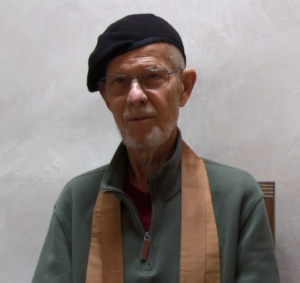 A Zen teacher in our White Plum lineage, psychotherapist, author, lover of nature and hiker, Musai Roshi studied with many great spiritual teachers including Maezumi Roshi, Suzuki Roshi, Trungpa Rinpoche, Jitsudo Roshi and Genpo Roshi. Teacher and priest at Prajna Zendo (prajnazendo.org) , he began studying Zen in 1970 with Shunryu Suzuki Roshi. He later became a student of Taizan Maezumi Roshi and remained with him until Roshi’s death in 1995, when Musai became Jitsudo Sensei’s student. Musai received dharma transmission from Jitsudo Sensei in 1999. In addition to Zen practice, Musai Roshi studied with Chogyam Trungpa Rimpoche. In his book, Off the Path, The Zen of Mountains and Deserts, he says, ”I began my Zen practice in the midst of a life crisis, under the guidance of Shunryu Suzuki Roshi. When I asked that Zen Master what I should do about my life dilemmas, he responded, ‘Do zazen. Life without zazen is like winding your clock without setting it. It runs perfectly well, but it doesn’t tell time.’ I have been following that advice for over four decades. I have turned to wild places for reassurance and adventure since I was a child. When I moved to Santa Fe, New Mexico in 1980 I found, in the Four Corners states, vast areas of mountain and desert wilderness where I could wander year-round, shedding the concerns of life in society and opening to the earth. These two fundamental streams of my life merge in my hikes and solo wilderness retreats. I hope in these photos and journals I can share some of the wonder and release I have found in this Buddhist wilderness practice.”
A Zen teacher in our White Plum lineage, psychotherapist, author, lover of nature and hiker, Musai Roshi studied with many great spiritual teachers including Maezumi Roshi, Suzuki Roshi, Trungpa Rinpoche, Jitsudo Roshi and Genpo Roshi. Teacher and priest at Prajna Zendo (prajnazendo.org) , he began studying Zen in 1970 with Shunryu Suzuki Roshi. He later became a student of Taizan Maezumi Roshi and remained with him until Roshi’s death in 1995, when Musai became Jitsudo Sensei’s student. Musai received dharma transmission from Jitsudo Sensei in 1999. In addition to Zen practice, Musai Roshi studied with Chogyam Trungpa Rimpoche. In his book, Off the Path, The Zen of Mountains and Deserts, he says, ”I began my Zen practice in the midst of a life crisis, under the guidance of Shunryu Suzuki Roshi. When I asked that Zen Master what I should do about my life dilemmas, he responded, ‘Do zazen. Life without zazen is like winding your clock without setting it. It runs perfectly well, but it doesn’t tell time.’ I have been following that advice for over four decades. I have turned to wild places for reassurance and adventure since I was a child. When I moved to Santa Fe, New Mexico in 1980 I found, in the Four Corners states, vast areas of mountain and desert wilderness where I could wander year-round, shedding the concerns of life in society and opening to the earth. These two fundamental streams of my life merge in my hikes and solo wilderness retreats. I hope in these photos and journals I can share some of the wonder and release I have found in this Buddhist wilderness practice.”